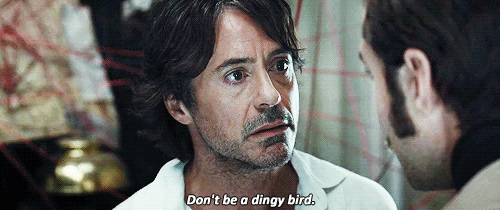It’s a good time to be a Sherlock Holmes fan. There are now plenty of adaptations to choose from. There’s the BBC’s Sherlock if you like visual inventiveness and whip-crack dialogue. For a more traditional procedural that does interesting things with characters, there’s CBS’s Elementary. For Hollywood thrills you can go back a few years to the films starring Robert Downey Jr. as the great detective. For series in the Holmesian spirit without the same characters there’s the medical drama House or the mystery/comedy Psych.
However the setting may change, there are some key elements of Sherlock Holmes’s character that remain the same: the keen powers of observation and deduction, the cycles of intense focus on a problem and lethargic dissipation, the antisocial habits that make him near impossible to live with.
Oh, and Sherlock Holmes is a total jerk-ass.
The standard interpretation of Holmes in modern media is that he is an asshole with no patience for anyone else, either because he’s not neurotypical in some fashion or because he just can’t be bothered to care about anything so pedestrian as decent manners. He gets away with it because he’s just so brilliant.
Well, lately I’ve been rereading the original Sherlock Holmes stories by Conan Doyle, something I’ve been meaning to do for years. I’ve gotten very used to the modern Holmes, so I was surprised to rediscover that the original Holmes wasn’t like that at all. In fact, Conan Doyle’s Holmes is compassionate and generous.
No, really, he is. Especially when dealing with someone in distress who needs his help. Here, for instance is how Holmes welcomes Watson and a wounded man looking for his help:
He received us in his quietly genial fashion, ordered fresh rashers and eggs, and joined us in a hearty meal. When it was concluded he settled our new acquaintance upon the sofa, placed a pillow beneath his head, and laid a glass of brandy and water within his reach.
“It is easy to see your experience has been no common one, Mr. Hatherley,” he said. “Pray, lie down there are make yourself absolutely at home. Tell us what you can, but stop when you are tired and keep up your strength with a little stimulant.”
– “The Adventure of the Engineer’s Thumb”
And here is how Holmes puts a frightened client at ease:
“Good-morning, madam,” said Holmes cheerily. “My name is Sherlock Holmes. This is my intimate friend and associate, Dr. Watson, before who you can speak as freely as before myself. Ha! I am glad to see that Mrs. Hudson has had the good sense to light the fire. Pray draw up to it and I shall order you a cup of hot coffee, for I observe that you are shivering.”
“It is not cold which makes me shiver,” said the woman in a low voice, changing her seat as requested.
“What, then?”
“It is fear, Mr. Holmes. It is terror.” She raised her veil as she spoke, and we could see that she was indeed in a pitiable state of agitation, her face all drawn and gray, with restless, frightened eyes, like those of some hunted animal. Her features and figure were those of a woman of thirty, but her hair was shot with premature gray, and her expression was weary and haggard. Sherlock Holmes ran her over with one of his quick, all-comprehensive glances.
“You must not fear,” he said soothingly, bending forward and patting her forearm. “We shall soon set matters right, I have no doubt.”
– “The Adventure of the Speckled Band”
Now, it’s true that Holmes isn’t always so polite, but he is rarely outright rude. The only people to whom Holmes is actually mean are those who don’t take him seriously or question his methods. He prefers to have a little fun at his detractors’ expense, though, rather than berate them openly. Here Holmes reveals the true culprit in the death of a shady horse trainer to the horse’s owner, who had been dismissive of Holmes’s work (spoilers for “Silver Blaze”):
“… You have done me a great service in recovering my horse,” [said Colonel Ross.] “You would do me a greater service still if you could lay your hands on the murderer of John Straker.”
“I have done so,” said Holmes quietly.
The colonel and I stared at him in amazement. “You have got him! Where is he, then?”
“He is here.”
“Here! Where?”
“In my company at the present moment.”
The colonel flushed angrily. “I quite recognize that I am under obligations to you, Mr. Holmes,” said he, “but I must regard what you have just said as either a a very bad joke or an insult.”
Sherlock Holmes laughed. “I assure I that have not associated you with the crime, Colonel,” said he. “The real murderer is standing immediately behind you.” He stepped past and laid his hand upon the glossy neck of the thoroughbred.
“The horse!” cried both the colonel and myself.
“Yes, the horse. And it may lessen his guilt if I say that it was done in self-defence, and that John Straker was a man who was entirely unworthy of your confidence.”
– “Silver Blaze”
Whatever else the literary Holmes may be, he is a gentleman. That gentlemanliness is one of the things modern adaptations are missing and in my opinion they suffer for it.
Image: High functioning sociopath via Dean Winchester is Dead. Dingy bird via MTV. Opinions via Giphy
In the Seen on Screen occasional feature, we discuss movies and television shows of interest.



Not to mention the whole Irene Adler thing. Romantic entanglement wasn’t even a remote possibility in that story -_-
Oh well…
LikeLike
Very true. Holmes and Adler in the short story have a mutual respect, which is much more interesting than the romance/flirtation/sexing-up the characters get in the various modern adaptations.
LikeLiked by 1 person
And considering the time in which it was written, was nothing short of remarkable. I mean, a woman equal in intellect to a man? Cue to old lady fainting.
LikeLike
I wonder whether this is where the tokenism still visible in present-day storytelling comes from. While it probably was “natural” for Victorians to only have one intelligent woman (or Black, Asian, what have you) per story, aren’t we supposed to have realized the folly of such narrow perceptions?
LikeLiked by 1 person
That’s another thing I’ve noticed on rereading the stories: when someone falls down and has a fainting fit an has to lie in bed for days to recover it’s usually a man. Women in Conan Doyle’s stories are (for the most part–a couple of exceptions) sensible, capable, and good to have around in a crisis.
LikeLiked by 1 person
Ahhaha, that’s so funny!
LikeLike
And thats pretty awesome!
LikeLike
One of my personal favorite adaptations which I feel is the most true to the original stories is definately the series put out by Granada Television, starring Jeremy Brett in the titular role. While some aspects of the stories were tweaked or left out altogether to allow for the televised format, the spirit of the stories remains nearly unchanged. Brett has an amazing range as Holmes as well. There’s the rudeness that encompasses modern Holmes, but there’s also the kindness that you speak of, almost playfully so. They really tried their best to hold true to the narrative, as well as trying (though sometimes failing) for historical accuracy as well. In the case of Irene Adler, there is the slight romantic subtext, but that is expressed through Watson’s narration during and after the bulk of the episode. When you remove Watson’s famous “romanticizing” of events, you can still see the core of mutual respect between Holmes and Adler.
LikeLike
I love Brett as Holmes and that whole production. You can tell that so much love for the stories went into that show.
LikeLiked by 1 person
That adaptation is actually what got me interested in the stories to begin with. I used to watch it every week with my grandmother before she died. At the time, I liked the RDJ films because come on, Iron Man as Sherlock Holmes is just awesome. But after getting hooked on Brett, it expanded my horizons, leading to buying the complete Sherlock Holmes volumes, as well as getting hooked on the BBC adaptation with Freeman and Cumberbatch. My local library has the entire Granada collection, with a smaller DVD set of the first series (with the first Watson, not the second.)
LikeLike
Ah, the Jeremy Brett versions. I’ve seen some of them when I was much younger, but it’s too long ago for me to remember whether I saw them all OR how they deal with the original material. Thanks for the reminder; I gotta check which Sherlock adaptations our library has!
LikeLiked by 1 person
I disagree. Yes, from our modern perspective Sherlock Holmes is a gentleman. But you have to see his behaviour from the perspective of a Victorian – and then a lot of what he does is really shocking. He does a lot a man during that time simply wouldn’t do, like lording his intelligence over other people, even people of higher rank, sometimes being downright insulting. Yes, he sometimes does show care when he encounters a client he perceives as particularly vulnerable (usually women). But he is not above telling someone that he considers him an idiot, though naturally in the more flowery language of the Victorian time. He shows outright amusement over the attempts of the King of Bohemia trying to conceal himself and ends the case with telling him that he is not on the same level as Irene Adler (the implication is that he is beneath her).
Or this exchange, from the Hound of the Baskervilles:
“Well?” said he.
“Do you not find it interesting?”
“To a collector of fairy tales.”
In other words: You are currently wasting my time. Come to the point.
Here some other examples of his sometimes questionable behaviour: “I am the last and highest court of appeal in detection. When Gregson or Lestrade or Athelney Jones are out of their depths—which, by the way, is their normal state—the matter is laid before me.”
It was one Sunday evening early in September of the year 1903 that I received one of Holmes’s laconic messages:
Come at once if convenient—if inconvenient come all the same.
— S. H.
(The Creeping Man)
“Caught cold, Watson?” said he.
“No, it’s this poisonous atmosphere.”
“I suppose it is pretty thick, now that you mention it.”
“Thick! It is intolerable.” (The Hound of the Baskervilles, The Problem)
LikeLike
Those are some useful counterexamples. The Victorian age is not my period and it’s entirely possible that the original Holmes is quite a jerk by the standards of his day but I simply don’t have the cultural context to see it. Interesting to think about.
LikeLike
It is something I didn’t realize myself before I watched the Granada version. Seeing the situation actually played out put it across what an odd duck Sherlock Holmes actually is in this environment…naturally Jeremy Brett interprets his words through the tone he uses, but they are straight from canon.
LikeLike